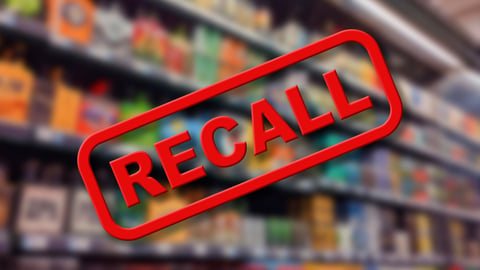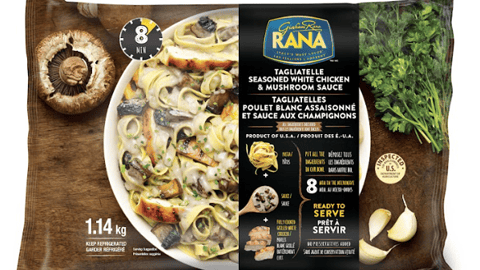With listeria top of mind, manufacturers are upping testing protocols: food experts
From frozen waffles and pancakes to beef jelly tongue, recent listeria recalls may have consumers concerned that more of the bacteria is infiltrating the food chain, but experts say that's not the case.
Extensive testing at the manufacturing level and a keen awareness of the issue among consumers is more likely why it feels like there are more recalls than normal, they say.
Rick Holley, a retired University of Manitoba food science professor, notes a frozen waffle recall last Friday (Oct. 18) involving dozens of products was issued by the food processing company first—rather than the Canadian Food Inspection Agency—after listeria was discovered during routine testing.
“What that means to me is that there's a heightened sensitivity on the part of the food industry,” he said.
READ: As climate change increases the risk of foodborne illnesses, transparency and planning is key
Manufacturer TreeHouse Foods expanded its recall this week to include more brands of frozen waffles and pancakes produced at its Brantford, Ont. facility.
Corporate executives are likely influenced by the fallout of a plant-based milks contamination earlier this year that sickened 20, leading to 15 hospitalizations and three deaths. A recall triggered a wave of media attention and a months-long investigation. The Pickering, Ont. facility remains closed for renovations.
But Holley says once public concern tied to listeria dies down and industry adjusts accordingly, "the amount of listeria might not change. It's just our awareness of it.”
Listeria is a ubiquitous bacteria that’s allowed to exist in a manufacturing environment below a federally regulated threshold unlikely to sicken a consumer. It can appear almost anywhere, spreading through an entire production line if a crack or crease is missed in routine cleaning, Meghan Griffin, a food safety and recall specialist at the CFIA, said in an August interview.
"We look at the different records and just the processes in the plant whenever there's any type of issue. We look at where the employees travel to—do they work on different lines or one line? We look at their sanitation protocols. We look at their ingredient list."
CFIA data shows there have been nine listeria-related recalls so far this fiscal year, which runs from April 2024-2025. There were 21 recalls from 2023-2024, and 14 recalls in 2022-2023.
In addition to CFIA inspections, manufacturers themselves are expected to collect and analyze weekly environmental samples from floors, walls, and ceilings, and submit results to the federal agency.
This kind of bacteria thrives in cold and moist environments, making refrigerated ready-to-eat food manufacturing plants ideal for listeria—a reality Randy Huffman is amply familiar with. He joined Maple Leaf Foods as its chief food safety officer not long after its 2008 listeriosis outbreak, which led to the death of more than 20 Canadians.
While Huffman says the company was testing at an appropriate rate that kept up to food safety standards at the time, and sharing results with the CFIA, it wasn’t enough. “The company had not done a good enough job of getting to the root cause and remediating the problems that were found.”
But since the outbreak, Huffman says Maple Leaf Foods has changed its approach. It now reacts to every positive listeria test, making changes accordingly, whether that be to sanitation protocols or employee practices. Huffman says the company didn’t change the frequency of testing, but rather, pivoted to take a more “aggressive” response to contamination.
In the same way that the Maple Leaf Foods outbreak brought change, Huffman says the recent recalls can serve as a "good wake-up call for all companies" and act as a reminder to "fight off complacency" in food safety practices.
When a listeria outbreak makes headlines, it triggers other facilities to do more extensive testing and in doing so, increases the likelihood of discovering a problem, says Amrou Awaysheh, a professor of operation and supply chain management at Indiana University.
Contamination can result from either a product or ingredient being brought into a facility, or at the processing level, says Awaysheh.
“If it's a product-based issue, then a lot of the suppliers are maybe having that same product,” he says, and in turn they're vulnerable to the same contamination.
A process-related issue means listeria has made its way into the manufacturing line, which could represent a problem with the way the product is made.
McMaster University microbiologist Lori Burrows points to the way waffles and plant-milks are produced.
“If you think about the way (waffles) are made, they would be made as a liquid batter. They would have to be piped through the production line. It's similar to the plant-based milk in that way. You have probably several meters, if not hundreds of metres, of hoses that you need to clean. Somewhere along the line, apparently that didn't get cleaned well enough,” says Burrows.
READ: Listeria outbreak linked to plant-based milk seems to be over, PHAC says
Given that listeria is a ubiquitous organism, Burrows says, “If you start to look harder and test more stringently, your numbers will go up because you're looking harder. So it's a balance between looking hard enough to find things that are egregious, but not so hard that you can never get to the compliance level.”
While listeria has seized consumers' attention, it wasn’t long ago that the same could be said for other foodborne illnesses, says Lawrence Goodridge, Canada research chair in foodborne pathogen dynamics at the University of Guelph.
“Don't forget before that it was salmonella," he said. "Salmonella in cantaloupes, salmonella in frozen corn, salmonella in onions.”
“Oftentimes it's what gets the attention. Listeria is hot right now.”



